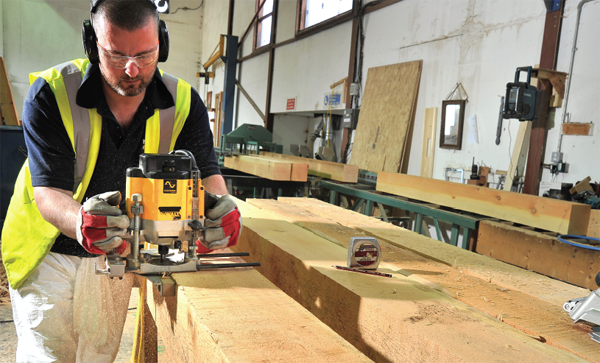
The dawn of a new construction era with pre-manufacture
In the December 2016 issue of ABC+D Magazine, Andrew Carpenter, chief executive of the Structural Timber Association explains why now is the time for developers, contractors, architects and Government to collaborate and embrace the inherent benefits that pre-manufacture construction offers the industry…
The ominous subtitle of the Farmer Review, Modernise or Die, indicates with clarity the severity of the challenge facing the industry at present. It has shone a light on many prevalent issues within the sector and those with the willingness and gumption to face its stark reality will welcome its findings.
The report, commissioned on request of the Government, found that the construction industry’s out dated and flawed training models, aversion to innovation and collaboration, as well as the lack of investment in research and development was severely affecting its productivity, pool of skilled workers and, ultimately, its ability to deliver much needed housing.
The solution, as put forward by the report, lies in embracing modern methods of construction, specifically off-site prefabrication, also known as pre-manufacture. Farmer also recommended the need for those operating within the construction supply chain to be more attentive, responsive and aligned to the needs of the customer or end client.
He states: “If you buy a new car, you expect it to have been built in a factory to exacting standards, to be delivered on time, to an agreed price and to a predetermined quality. There are more similarities between manufacturing and construction than many people are led to believe and this perception needs to change, starting in the housing market.”

“The Farmer Review should be used as a catalyst to drive positive disruption and widespread collaboration…” – Andrew Carpenter Structural Timber Association
One sector that is primed for this widespread evolution in construction methods for the delivery of more housing is structural timber frame. In fact, pre-manufacture is not a recent or novel concept to those within the structural timber frame industry. Invested in significantly for several years, automated factory-based manufacturing has enabled the sector to deliver properties in a more cost-effective, productive and more timely manner when compared to other traditional build methods and materials.
Facilitating specific end user and architectural demands to be met more easily, factory-based manufacturing moves reliance from on-site tradespeople to facilities with precision engineered machinery. Pre-manufactured structural timber frame can be monitored at every stage of its construction and is not reliant on a multitude of other trades and factors.
A factory-based environment also ensures safer working conditions for employees, which provides a much-needed boost to industry reputation and is paramount to attracting prospective talent. Pre manufacture doesn’t carry the same height risks as construction carried out on-site and is not weather reliant. This is a huge benefit given our changeable climate.
Furthermore, the structural timber frame sector has significant growth potential, with the capacity to double its output, if and when required, due to a consistent strive for best practice. Steadily increasing in market share, up by 10% since 2004, structural timber frame can be a key element in the Government and industry’s drive to provide more housing in a modern, productive and effective manner.
Tackling other facets of the issues identified by the Farmer Review, pre-manufacture offers a significantly easier and quicker route into construction, providing an almost immediate remedy to the skills shortage when compared to several years of training required for on-site trades.
A tangible solution to the barriers the construction industry faces, those within the pre-manufacture sector should be poised for further growth and supply chain engagement.
As such, the Farmer Review should be used as a catalyst to drive positive disruption and widespread collaboration and there is evidence that this desire is present within the industry.
This is demonstrated by recent partnerships agreeing to utilise the inherent benefits of pre-manufacture and structural timber frame, such as contractor, Willmott Dixon and manufacturer, Robertson Timber Engineering, collaborating to deliver 1,000 pre-manufactured households a year.
Additionally, major stakeholders from within construction and the Government itself have responded positively to the Farmer Review.
Industry minister, Jesse Norman, reiterated that the Government “is determined to support more housebuilding, more quickly and in the places people want to live”, conceding that the report “makes a strong case for change in the industry” and “identifies areas where it needs to improve.”
Laing O’Rourke also issued a statement: “There is significant scope for radical transformation through the adoption of new technologies and advanced manufacturing approaches. This will deliver the quality housing stock the UK urgently requires and directly address the acute skills gap that threatens our very future.”
However, without action these words are just white noise. The UK construction industry’s history has been categorised and segmented by certain trends in building material and methods of construction and it is clear that, at this point in time, the sector stands at the crossroads of a defining epoch.
As the findings of the Farmer Review echo through construction institutions throughout the country, the industry must adhere to the message, comprehensively embracing pre-manufacture or, in other words, “Modernise or Die.”
Latest news

21st February 2025
ASSA ABLOY EMEIA: Save valuable time and money with a seamless switch to programmable digital keys
In 2025, access management can be a whole lot easier. By making access part of their digital processes, businesses can put time-consuming key management and the cost of changing the locks firmly behind them. Making this switch is a lot easier than many people think, as ASSA ABLOY explains here…
Posted in Access Control & Door Entry Systems, Architectural Ironmongery, Articles, Building Industry News, Building Products & Structures, Building Services, Doors, Facility Management & Building Services, Health & Safety, Information Technology, Innovations & New Products, Retrofit & Renovation, Security and Fire Protection
21st February 2025
Showersave supports industry leaders in addressing Part L and Part G regulations
Showersave has sponsored and participated in a recent Building Insights LIVE roundtable on ‘Water & Energy Saving Innovations in New Build Housing’.
Posted in Articles, Bathrooms & Toilets, Bathrooms, Bedrooms & Washrooms, Building Associations & Institutes, Building Industry Events, Building Industry News, Building Products & Structures, Building Regulations & Accreditations, Building Services, Exhibitions and Conferences, Interiors, Pipes & Fittings, Plumbing, Retrofit & Renovation, Sustainability & Energy Efficiency
21st February 2025
GEZE: The importance of Specifying High Quality Door Closers on Fire Doors
Andy Howland, Sales & Marketing Director at GEZE UK, discusses why specifying high quality door closers on fire doors is important…
Posted in Access Control & Door Entry Systems, Accessibility, Architectural Ironmongery, Articles, Building Industry News, Building Products & Structures, Building Regulations & Accreditations, Building Services, Doors, Facility Management & Building Services, Health & Safety, Posts, Restoration & Refurbishment, Retrofit & Renovation, Security and Fire Protection
21st February 2025
Insight Data achieves ISO9001 recertification with zero non-conformities
Leading industry data specialist, Insight Data, has successfully achieved the prestigious recertification for ISO9001 with zero non-conformities for the fourth consecutive year.
Posted in Articles, Building Industry News, Building Regulations & Accreditations, Building Services, Information Technology, Research & Materials Testing
 Sign up:
Sign up: